If you were born in the seventies and are a child of the eighties, chances are you’re familiar with some iconic movies. Star Wars, E.T, Back To The Future and countless others have stood the test of time and earned our respect and appreciation but there’s one particular series that I hold in high regard.
I’m talking about Rocky, which has now added a new twist with the recent release of “Creed”.
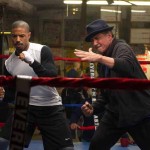 I had a chance last weekend to see the movie and I thought the writing, production, and story created by Ryan Coogler was brilliant. There was a connection between the past and the present and the general public seemed to agree because the film has produced nearly 70 million dollars in 2 weeks.
I had a chance last weekend to see the movie and I thought the writing, production, and story created by Ryan Coogler was brilliant. There was a connection between the past and the present and the general public seemed to agree because the film has produced nearly 70 million dollars in 2 weeks.
After watching “Creed” with my son Dylan, I realized that he hadn’t been exposed to the Rocky series. I felt he’d enjoy it and connect to it the way I once did, so I picked up the Rocky 1-4 DVD set and this past week we started watching them one by one. As I expected, he loved them too.
I began thinking about the reasons why I felt a connection to those films and why my son who’s nearly thirty years younger felt the same. For a film to span generations and deliver the same reaction, it has to have certain ingredients. Consider that Rocky 1-3 each generated over 200 million dollars, and Rocky 4 produced 300 million. If the formula leads to that type of success, I’m interested in understanding it better.
What I discovered was that the same reasons my son and I love Rocky, are the same reasons the best sports talk shows stand out. There are many components in a show that help it resonate with an audience which is constantly being bombarded with distractions. I think you’ll agree as you sort through this piece, that the similarities between the two are very similar.
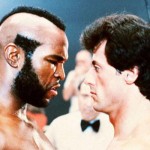 Every Talk Show Needs A Villain – In Rocky you get some of the best of all-time, Apollo Creed, Mr. T, Ivan Drago, etc. Whether it’s Apollo’s insults towards Rocky and painting him as a hopeless bum, Mr. T verbally attacking Rocky’s wife and sending his trainer Mick to his death, or Drago killing Apollo inside the ring, all of those characters evoke an emotion of anger and frustration and make us more sympathetic and emotionally attached to the Rocky character. When you hear Drago say “If he dies, he dies“, it’s impossible to not want to jump through the screen and hit him yourself. That’s what a villain brings to the content experience.
Every Talk Show Needs A Villain – In Rocky you get some of the best of all-time, Apollo Creed, Mr. T, Ivan Drago, etc. Whether it’s Apollo’s insults towards Rocky and painting him as a hopeless bum, Mr. T verbally attacking Rocky’s wife and sending his trainer Mick to his death, or Drago killing Apollo inside the ring, all of those characters evoke an emotion of anger and frustration and make us more sympathetic and emotionally attached to the Rocky character. When you hear Drago say “If he dies, he dies“, it’s impossible to not want to jump through the screen and hit him yourself. That’s what a villain brings to the content experience.
If you look at it from a talk show perspective, the villain usually comes in the form of a central figure on the day’s biggest topics. For example, “The NFL Referees blew the call and screwed us“, “Greg Hardy should be cut by the Dallas Cowboys but Jerry Jones is asleep at the wheel“, “Dave Stewart and Tony LaRussa got fleeced by the Braves and have damaged our future“, “Jed York’s ego caused the 49ers to lose Jim Harbaugh and become mediocre“.
Whichever example you use, when we highlight a topic that is timely and built around a polarizing figure or questionable decision, it puts the host in the hero position. This makes the audience pull for you and it keeps them engaged in your content. Most people in the world root for good over evil and they want the underdog or blue collar guy to knock off the favorite or white collar individual.
The one exception to this is when you have a talk show that is built around a controversial figure. Love and hate are two big reasons why audiences tune in and a big part of why shows like First Take and Bill O’Reilly generate the buzz and success that they do. Regardless of your personal feelings towards them, they embrace the role of the villain and in doing so, they grab your attention.
If you paint an effective picture of a character and outline why they deserve our wrath or attention, you place yourself inside the crowd and 99 times out of 100, they’re going to stand right by your side. Even if they don’t though, they’re still invested in what’s being said and that’s what matters most in measuring success.
 Every Talk Show Needs Laughter – Rocky delivers some memorable one-liners that are still remembered forty years later. Classics such as “Women weaken legs“, “You’re going to eat lightning and crap thunder”, “I feel like a Kentucky Fried idiot” and “Why do I want to fight? Because I can’t sing or dance” stay with us because they’re timely, well executed and offer a nice change of pace. By creating moments that allow us to laugh, it breaks things up and makes the dramatic scenes stand out more.
Every Talk Show Needs Laughter – Rocky delivers some memorable one-liners that are still remembered forty years later. Classics such as “Women weaken legs“, “You’re going to eat lightning and crap thunder”, “I feel like a Kentucky Fried idiot” and “Why do I want to fight? Because I can’t sing or dance” stay with us because they’re timely, well executed and offer a nice change of pace. By creating moments that allow us to laugh, it breaks things up and makes the dramatic scenes stand out more.
In a talk show, the same challenge exists. Every host can hit hard with opinions, interact with or take on a caller, and ask a good question of a guest, but when the intensity is building, do you have the clock in your head and the wit and creativity to mix it up by offering a strong one-liner? If not, do you have a go-to drop to help emphasize your points in a funny fashion? Can you keep the audience on the edge of their seat wondering if today will be the day you have them emotionally angry, happy, sad, or laughing?
Being naturally funny and self-deprecating goes a long way with people. Those who can pull it off will find the audience sees them as being human, relatable and capable of not taking themselves too seriously. Those who can’t are usually perceived as being unapproachable, out of touch or even worse, a complete asshole. We can all be on a quest to find the truth in sports and seek to deliver opinions that rattle a person’s bones, but when you allow and invite light hearted moments to become part of your daily experience, you benefit a lot more from it.
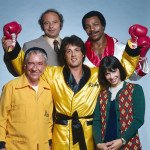 Every Talk Show Needs a Great Supporting Cast – In Rocky, Sylvester Stallone plays the lead role and as great as he is, he earns legendary status because he’s surrounded by great villains (Creed, Drago, T) and a memorable supporting cast (Adrian, Paulie, Mick, Thunderlips, etc.). These people play a vital role in helping introduce love, sadness, drama, anger and doubt into the story and without them the movie would miss the mark. Every twist and turn in the Rocky series, revolves around those words and every key moment includes those people.
Every Talk Show Needs a Great Supporting Cast – In Rocky, Sylvester Stallone plays the lead role and as great as he is, he earns legendary status because he’s surrounded by great villains (Creed, Drago, T) and a memorable supporting cast (Adrian, Paulie, Mick, Thunderlips, etc.). These people play a vital role in helping introduce love, sadness, drama, anger and doubt into the story and without them the movie would miss the mark. Every twist and turn in the Rocky series, revolves around those words and every key moment includes those people.
Now think about it from a talk show perspective. Do you have an update anchor involved in your program? Does the producer play a role? Do you use your voice guy or callers to add to the content? Are there set guests who are with you daily or weekly and have become a part of the show’s dysfunctional family? Maybe the Program Director or General Manager is brought into the show as “The man” trying to hold you back. You can use created voices/characters too.
Regardless of the approach, all of these things contribute to the show’s entertainment value. Rather than going it alone and focusing on yourself, think about how you can use others to further lift the show and help you showcase the multiple sides of your personality. The more you offer to the audience, the harder it is for them to change the dial.
 Every Talk Show Needs Authenticity – One of the real beauties of the Rocky character is that he represents everyone in the world who’s trying to make ends meet to survive and prove they’re not a failure. He’s a normal guy from the streets of Philadelphia who was given an opportunity and took advantage of it, even when the whole world doubted him. He may not be the sharpest tool in the shed but he’s kind, respectful, funny, genuine and honest. We see a man who might not be the best in his sport, but has heart and courage and is willing to try. Those qualities make us root for him. He’s the real life version of David overcoming Goliath.
Every Talk Show Needs Authenticity – One of the real beauties of the Rocky character is that he represents everyone in the world who’s trying to make ends meet to survive and prove they’re not a failure. He’s a normal guy from the streets of Philadelphia who was given an opportunity and took advantage of it, even when the whole world doubted him. He may not be the sharpest tool in the shed but he’s kind, respectful, funny, genuine and honest. We see a man who might not be the best in his sport, but has heart and courage and is willing to try. Those qualities make us root for him. He’s the real life version of David overcoming Goliath.
As a personality, you have to be yourself and put yourself on display. Every positive attribute and every flaw should be showcased every single day. When people know who you are and what you represent and can count on you to be consistent, it makes it easier to listen to you. People tune in for hosts for multiple reasons but if they feel like you’re putting on an act or holding back, they’ll sniff it out and stop listening.
Who you are on the air should be reflected by who you are off the air. What we see on social media or when a camera is on, should be consistent with the person we listen to through the speakers. Sometimes people feel the need to try and change their voice to sound stronger or play a character on the air to generate bigger buzz and it may work for a little while but it can’t be sustained. Being yourself, embracing your strengths and weaknesses, and not being afraid to invite the audience in, are things you can do until the day you retire.
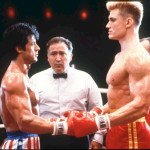 Every Talk Show Needs Drama – If there’s one quality that separates a Rocky movie from many others, it’s the film’s consistent ability to produce high level drama. From Balboa’s quest to connect with Adrian, to his troubles with Paulie, to his issues with Mick, to the loss of people close to him, to the fight’s themselves, each movie provides twists and turns which leave you emotionally spent.
Every Talk Show Needs Drama – If there’s one quality that separates a Rocky movie from many others, it’s the film’s consistent ability to produce high level drama. From Balboa’s quest to connect with Adrian, to his troubles with Paulie, to his issues with Mick, to the loss of people close to him, to the fight’s themselves, each movie provides twists and turns which leave you emotionally spent.
If you’ve watched these films and didn’t feel a sense of nervousness or excitement when Apollo slid down at the count of 9 and Rocky won the title, or when Mr. T says “My prediction? Pain!“, or when Ivan Drago utters “I must break you”, then get your pulse checked immediately. Each movie delivers a powerful story that is easy to connect with and the journey through that story is what makes it important to us.
It’s no different than what you deal with each day when building topics on a talk show. Any host can hit the airwaves and ask “How confident are you that this team can make the playoffs“. It’s low hanging fruit. You give an opinion on a timely issue, relay a few stats, build some hope, generate calls and tweets, and then sign off and go home.
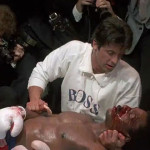 But is that memorable? Will it leave your audience confused, excited, nervous, angry and talking with their friends and families about what they heard on your show? No!
But is that memorable? Will it leave your audience confused, excited, nervous, angry and talking with their friends and families about what they heard on your show? No!
What works is when you can dig deeper into a topic and find a creative and compelling way to tell the story. That stirs emotion.
Think about some of the items I’ve mentioned above. Does the story include a villain? Does it include laughter? Are their others in the show adding something different to the discussion? Is there conflict? What parts offer me hope and which ones have me concerned?
Once you have those elements, then it comes down to the headline you create, the way you frame the story, and your ability to extend the conversation in a compelling way.
Close your eyes for a second and envision one listener in a car listening to you. Can you hold their attention for five minutes? Ten minutes? If you can’t, you’ve got no ratings.
The way to invade someone’s mind is by being authentic, offering a firm position, using facts to support your stance, and delivering the story creatively.
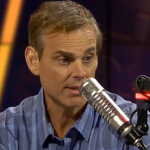 The reason Colin Cowherd stands out to so many in our industry is because he’s an amazing storyteller. He doesn’t go into a show reliant on phone calls and he doesn’t take the bait on simple topic points. He also puts time into writing some of his opinions and analogies and he understands when to stick to the script and when to toss it aside.
The reason Colin Cowherd stands out to so many in our industry is because he’s an amazing storyteller. He doesn’t go into a show reliant on phone calls and he doesn’t take the bait on simple topic points. He also puts time into writing some of his opinions and analogies and he understands when to stick to the script and when to toss it aside.
For example, if Colin was hosting a local show in Arizona today, I doubt you’d hear him build a segment by asking “Did the Diamondbacks give up too much for Shelby Miller“. The obvious answer is yes and with that response comes little drama, suspense or unpredictability. If the audience can figure out the answer without having to think too much about it, then why would they stick around to listen to you?
While I’m no nostradamus and not inside Colin’s brain, I do think that if he was hosting locally in Arizona today, he’d offer something different on the subject. I’d expect him to use the topic as a starting point for explaining why in life you sometimes pay more for things than what they’re worth, and how a short-term benefit can often be worth the long-term pain.
That’s what a great storyteller does. They look beyond the headline and search for ways to make it interesting, making sure that drama is a part of every single conversation.
By taking this path, it makes the local listener forget about how much the team gave up and gives them a chance to see the story from another perspective. You think they’ll care as much about Miller’s asking price next October if it results in a World Series title? No!
By approaching it differently and more creatively, it lends itself to becoming content that lives in the mind of the audience well beyond the show. And that’s what counts.
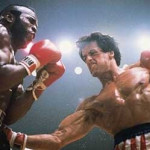 Think for a second about the Rocky story and picture it as a real life topic today. Some hosts would hit the airwaves asking “Do you think this underdog can shock the world and knock off the champion? Your calls and tweets next“. They’d give their opinion, field the audience’s reaction, maybe invite a guest or two on the show, and then blame the subject matter if the ratings for the segment were low.
Think for a second about the Rocky story and picture it as a real life topic today. Some hosts would hit the airwaves asking “Do you think this underdog can shock the world and knock off the champion? Your calls and tweets next“. They’d give their opinion, field the audience’s reaction, maybe invite a guest or two on the show, and then blame the subject matter if the ratings for the segment were low.
But if you took a great storyteller like Sylvester Stallone or Ryan Coogler (writer and director for “Creed”) and gave them the microphone, you’d be taken through a very different emotional experience with the content. Based on the results their films have produced, I think they’d do ok in the ratings!
Because they concentrate on telling a powerful story that can move an audience and they incorporate all of these qualities above, we’re still discussing these movies forty years later. The only question now is, when will there be a Creed 2? And will it be as successful as the first one?
Ask yourself, “Is my show selling out the theatre on a daily basis“? “Do I leave people wanting more like “Creed” has? Am I incorporating these qualities into my show? If not, you may want to consider it. Who knows, they could help you stay relevant for the next forty years!

Jason Barrett is the Founder and CEO of Barrett Media. The company launched in September 2015 and has provided consulting services to America’s top audio and video brands, while simultaneously covering the media industry at BarrettMedia.com, becoming a daily destination for media professionals. Prior to Barrett Media, Jason built and programmed 95.7 The Game in San Francisco, and 101 ESPN in St. Louis. He was also the first sports programmer for SportsTalk 950 in Philadelphia, which later became 97.5 The Fanatic. Barrett also led 590 The Fan KFNS in St. Louis, and ESPN 1340/1390 in Poughkeepsie, NY, and worked on-air and behind the scenes at 101.5 WPDH, WTBQ 1110AM, and WPYX 106.5. He also spent two years at ESPN Radio in Bristol, CT producing ‘The Dan Patrick Show’ and ‘GameNight’. JB can be reached on Twitter @SportsRadioPD or by email at Jason@BarrettMedia.com.




